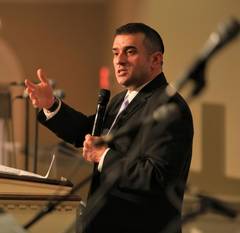- About Us
- Learning
- Resources
- Get Involved
- Membership
- Jobs
Who Do We Become
04/29/2020 02:02:09 PM
Rabbi Brent Spodek
| Author | |
| Date Added | |
| Automatically create summary | |
| Summary |
 |
Barack Obama holding an umbrella for Valerie Jarrett and Anita Decker Breckenridge |
This week, we read that we are to “be holy, for I, Adonai, am holy,’ – which sounds good, but is somewhat less clear than the instructions to say, not eat pork.
Ramban, one of the most important of the medieval mystics, explains it as follows:
“…the Torah has warned us against immorality and forbidden foods, but it permits sexual relations between man and wife, and the eating of certain kinds of meat and wine. Since this is so, a person could think that it is permitted to be passionately addicted to intercourse, and be ‘among those who guzzle wine or glut themselves on meat’ and speak freely of all profanities, since this is not explicitly forbidden. The result is that he will become a scoundrel within the permissible realm of Torah [naval bi-reshut ha-Torah]. Therefore, after listing the specific conduct that is forbidden, the Torah continues with a general command that we practice moderation even in matters which are permitted.”
Ramban goes on to explain that this is how Jewish law unfolds: detailed examples followed by a general command. So, the Torah explicitly forbids certain kinds of conduct, such as theft, robbery, and overcharging in business. But it also contains general rules such as, ‘You shall do that which is right and good’ – which include going ‘beyond the strict requirements of the law’ and a willingness, for the sake of equity, to forego the full extent of one’s legal rights.
Beyond prescribing or forbidding specific actions, Judaism invites us to develop certain virtues – what Alexis de Tocqueville called ‘habits of the heart.’ The Torah is concerned not only with behavior but also with character; not just with what we do but also the kind of person we become.
You can keep all the laws of kashrut, implies Ramban, and still be a glutton. You can drink only kosher wine and still be a drunkard. He calls such a person a naval bi-reshut ha-Torah, meaning, one who is coarse, crude, self-indulgent but who justifies his conduct by claiming, perhaps sincerely, that he is a strict observer of the law. In a very real sense, you cannot be an observant Jew and be arrogant, insensitive, tactless, prone to anger or pride.
The law itself points to something beyond the law. Ramban located this in the command, ‘You shall be holy’ - there is a dimension of the moral and spiritual life that cannot be specified in the form of precise legislation. It has to do with self-restraint, moderation, gentleness, sensitivity, and the thousand other forms of emotional literacy which you cannot learn from a book of rules, but only from experience and example.
One of the great Jewish mystics, Rabbi Leib Saras, used to say that he traveled to Rabbi Dov Baer of Mezeritch, not to learn biblical interpretations but to see how the Rabbi tied his shoelaces. The Talmud speaks of the ‘foolish’ Jews of Babylon who ‘stand in the presence of a Torah scroll but not in the presence of a great human being.’ A great sage is a living Torah scroll. There are textbooks and there are textpeople. We learn rules from books. But we learn virtue by finding virtuous people and seeing how they behave.
To be holy is to undergo an extended process in character-formation and moral growth. In this sense, ethics is like art. There are rules for constructing a sonnet, but obeying them does not turn you into Shakespeare. It is also like leadership. There are a few basic rules, but beyond that, leaders have little in common. Halakhah defines the basic parameters of a Jewish life. It is within those parameters that the search for moral wisdom takes place. Halakhah is a necessary but not sufficient condition of a life lived in pursuit of the ideal.
To be conscious of the presence of the Holy One is to become a different sort of person from one who believes that the physical world is all there is, that there is no authority beyond mere power, and that there is no meaning to existence. There are people who are successful, clever or powerful – but there are also people who are holy, and you can tell it by their demeanor, their way of relating to people. They seem to point to something beyond. That, says Ramban, is the challenge in those simple words at the beginning of Kedoshim: ‘Be holy.’ Holiness is not just what we do but also the kind of person we become.
Wed, October 22 2025
30 Tishrei 5786
RABBI BRENT SPODEK

Join Our Mailing List
Privacy Settings | Privacy Policy | Member Terms
©2025 All rights reserved. Find out more about ShulCloud


